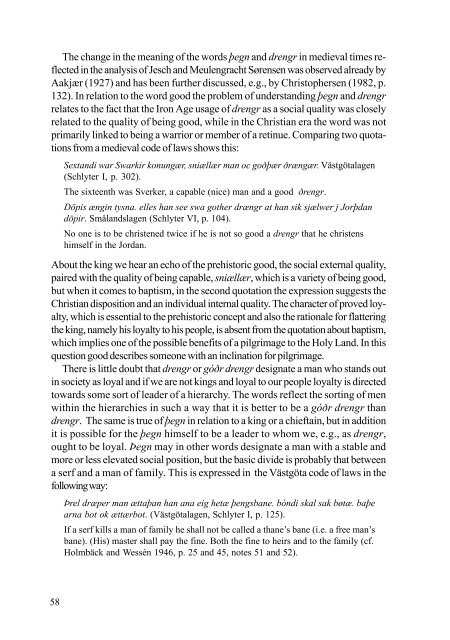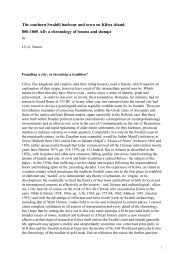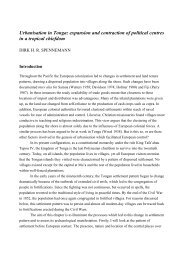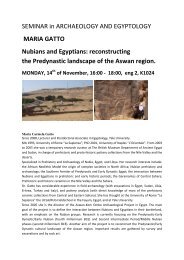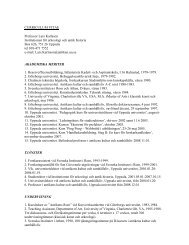Beowulf - Institutionen för arkeologi och antik historia
Beowulf - Institutionen för arkeologi och antik historia
Beowulf - Institutionen för arkeologi och antik historia
You also want an ePaper? Increase the reach of your titles
YUMPU automatically turns print PDFs into web optimized ePapers that Google loves.
The change in the meaning of the words þegn and drengr in medieval times reflected<br />
in the analysis of Jesch and Meulengracht Sørensen was observed already by<br />
Aakjær (1927) and has been further discussed, e.g., by Christophersen (1982, p.<br />
132). In relation to the word good the problem of understanding þegn and drengr<br />
relates to the fact that the Iron Age usage of drengr as a social quality was closely<br />
related to the quality of being good, while in the Christian era the word was not<br />
primarily linked to being a warrior or member of a retinue. Comparing two quotations<br />
from a medieval code of laws shows this:<br />
58<br />
Sextandi war Swarkir konungær, sniællær man oc goðþær ðrængær. Västgötalagen<br />
(Schlyter I, p. 302).<br />
The sixteenth was Sverker, a capable (nice) man and a good ðrengr.<br />
Döpis ængin tysna. elles han see swa gother drængr at han sik sjælwer j Jorþdan<br />
döpir. Smålandslagen (Schlyter VI, p. 104).<br />
No one is to be christened twice if he is not so good a drengr that he christens<br />
himself in the Jordan.<br />
About the king we hear an echo of the prehistoric good, the social external quality,<br />
paired with the quality of being capable, sniællær, which is a variety of being good,<br />
but when it comes to baptism, in the second quotation the expression suggests the<br />
Christian disposition and an individual internal quality. The character of proved loyalty,<br />
which is essential to the prehistoric concept and also the rationale for flattering<br />
the king, namely his loyalty to his people, is absent from the quotation about baptism,<br />
which implies one of the possible benefits of a pilgrimage to the Holy Land. In this<br />
question good describes someone with an inclination for pilgrimage.<br />
There is little doubt that drengr or góðr drengr designate a man who stands out<br />
in society as loyal and if we are not kings and loyal to our people loyalty is directed<br />
towards some sort of leader of a hierarchy. The words reflect the sorting of men<br />
within the hierarchies in such a way that it is better to be a góðr drengr than<br />
drengr. The same is true of þegn in relation to a king or a chieftain, but in addition<br />
it is possible for the þegn himself to be a leader to whom we, e.g., as drengr,<br />
ought to be loyal. Þegn may in other words designate a man with a stable and<br />
more or less elevated social position, but the basic divide is probably that between<br />
a serf and a man of family. This is expressed in the Västgöta code of laws in the<br />
following way:<br />
Þrel dræper man ættaþan han ana eig hetæ þengsbane. bóndi skal sak bøtæ. baþe<br />
arna bot ok ættærbot. (Västgötalagen, Schlyter I, p. 125).<br />
If a serf kills a man of family he shall not be called a thane’s bane (i.e. a free man’s<br />
bane). (His) master shall pay the fine. Both the fine to heirs and to the family (cf.<br />
Holmbäck and Wessén 1946, p. 25 and 45, notes 51 and 52).


